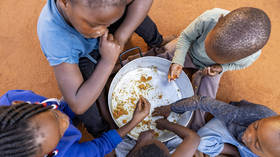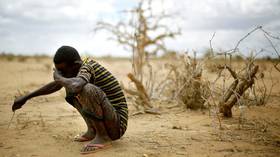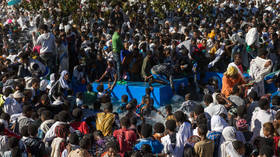GMOs and climate change: How 21st-century colonialists offload their burdens to Africa
African countries should be aware and act in their own interests, not Western ones, when facing global challenges
Climate change is an existential threat to Africa, and Africa is bearing the brunt of it despite its negligible contribution to carbon emissions. Africa’s weak states are often poorly governed, so climate change is bound to accelerate Africa’s governance challenges and political instability. Owing to unpredictable weather patterns, climate change has contributed to resource scarcity, food insecurity (due to low yields or failed harvests), prolonged droughts, regular floods, wildfires, locust invasions, and a rise in the disease burden.
Conflicts over scarce resources and mass unrest in urban areas due to failing economies are likely to increase in Africa. Poverty and inequality are already rife because of the debt burden, unfavorable terms of trade, endemic corruption, and the exploitation of Africa’s resources by external actors in concert with predatory local political elites. This is a powder keg.
Governance is integral to the mitigation of climate change. Africa’s vulnerability stems from its weak institutions, and external meddling in its affairs, which takes the form of predation by imperialist forces. A vicious colonial legacy characterized by environmental degradation, crushing poverty, inequalities, and protracted violence undermines the state in Africa. In the extant global order, the West exercises outsized power, resulting in poverty and chaos in far-flung regions – the periphery, according to world-systems theory. Thus, the climate change problem falls within the center-periphery problem.
Climate change, therefore, is about more than just ecology. Africa’s political elite are not innocent bystanders, either. They hoard power and the attendant economic benefits at the expense of the masses and facilitate imperial exploits. This widespread ecosystem of inequality, social injustice, exploitation, and violence is the crux of the problem.
Adaptation efforts, unless sensitive to inequality and the power imbalance that pivots international relations, are not sustainable. Climate change negotiations are mired in a historical ecology of predation, colonialism and imperialism that has had Africa in a chokehold for millennia. Thus, the inequitable global power divide runs insidiously throughout the climate change discourse. The greatest carbon emitters, the Western countries, have a moral responsibility to reverse the effects of climate change but tend to insist on sharing the burden. China and India, which are also carbon emitters because of rapid economic advancement, also bear responsibility.
Due cognizance must be accorded to the indigenous knowledge systems in Africa for the sustainability of climate change adaptation measures. Amid the green energy transition initiatives, Africa must assert itself regarding indigenous seeds and time-tested traditional forms of knowledge to ensure equity, justice, and sovereignty.
The implementation of well-thought-out action plans across Africa, political will, financial and technical support from the West, and cooperation with fast-developing China and India are prerequisites for climate change mitigation strategies. Africa, however, must be cautious, because underneath this support could lie strings. China’s energy demand, owing to its ambitious development agenda, now rivals the West. This renders China indispensable to climate change negotiations. Africa should devise strategies that do not replicate conventional Western consumption models. Furthermore, the top-down approach that undergirds the lopsided West-Africa relationship is no longer tenable.
How capitalism is responsible for climate change
Transportation and communication, which are necessary for the movement of goods, services, and capital, require energy. Until now, fossil fuels – oil, and natural gas – coupled with technology have been the lynchpin of capitalism. The consumption of fossil fuels, however, produces carbon emissions. The share of Africa in carbon emissions is minuscule because of minimal industrialization. Africa is not energy sufficient, having not invested in solar, wind, geothermal, hydroelectric power, or the latest, lithium battery technology, due to its lack of capital and technical expertise, bad governance and external meddling. All this means that Africa’s reliance on ‘dirty’ energy such as oil, coal, and wood shall persist for years.
Innovation, creativity, invention, and expansion are at the heart of capitalism. Through technological advancement, manufacturing increases through mass production. Agriculture, the nucleus of economic sophistication, requires mechanization. Global supply chains and markets depend on transportation and communication. These energy-intensive processes have propelled the West to economic prosperity. However, the corresponding demand for consumer goods and services, courtesy of high incomes, threatens the very survival of the Earth.
Industrialization birthed early urbanization, but Africa’s cities are no more than a refuge for the vulnerable – the disenfranchised, dispossessed, and marginalized. Due to the absence of industrialization, cities in Africa are largely sprawling shantytowns without commensurate social amenities, security, or even dignity for the majority of the inhabitants. Urbanization, in fact capitalism, thrives on an apartheid-like template. It enhances separate development – an oxymoron. Privileges are reserved for the few, naturally the self-entitled political elite and their cronies, while the rest of the population is bogged down in violence, crime, grime, and poverty. The high cost of living, whose hallmarks include lack of sanitation, potable water, clean energy, and housing has forced the marginalized to resort to survival tactics that degrade the environment and their well-being.
African countries are indebted to the West, as well as emerging powers such as China. The legacy of colonialism, imperialism and retrogressive politics accounts for this state of affairs. The mainstay of Africa’s economies is a combination of tourism, agriculture, and fishing, which are all at risk because of climate change that, it must be underscored, is not a factor of geography or fate but a historical process tied to unequal global power relations. The debt burden, because of neoliberal economic policies, accounts for vast inequalities globally that put African countries in a precarious state. Since climate change mitigation is costly, it means that peripheral regions in Africa, the Caribbean and the Pacific Islands will lag.
The hegemonic discourse
In the climate change discourse, the North-South relations are ubiquitous, but it hardly captures aspects of domination, given that practices meant to reduce carbon emissions promote consumption in the West and precipitate ecological effects in Africa. Ironically, innovation meant to ramp up agriculture threatens Africa’s food security.
The replacement of traditional agriculture in Africa with genetically modified organisms (GMOs), for instance, is aimed at improving food production with drought and disease resistant and high yielding seed varieties. This adaptation measure, however, could render traditional seed varieties in Africa extinct. Local farmers are perilously reliant on GMO producers for their food security. The GMO technology, as well-intentioned as it may be, effectively threatens to obliterate indigenous seeds, rob local farmers of seed sovereignty, and could cause a humanitarian catastrophe in the event that the GMO seed fails. Only the patent owners, multinationals, could “rescue” the besieged population in such an unenviable scenario. In a way, climate change provides a pretext for the West to encroach further on Africa’s identity, its knowledge systems and sovereignty through seed engineering.
Climate change mitigation strategies are hegemonic in the sense that they have been devised and are championed by the West with little or no input from Africa. The influence of Western entities in Nairobi, Kenya, during the maiden Africa Climate Summit in September 2023 was telling.
Some civil society activists were alarmed: “Rather than advancing Africa’s interests and position on critical climate issues, the summit has been seized by Western governments, consultancy companies, and philanthropic organizations hell-bent on pushing a pro-West agenda and interests at the expense of Africa. Even more worryingly … the lead of African officials and ministers has been pushed on the backburner,” observed activists in an open letter signed by more than 500 civil society organizations.
The summit evoked the donor-recipient binary and had neocolonial and imperial undertones. Bill Gates’ interest in agriculture in Africa and its food security, for instance, is not value-free, given that he has shares in Monsanto (now Bayer). This US multinational, which produces GMOs and pesticides, has been accused of environment degradation, and, through patent rights and intellectual property, the erosion of seed and food sovereignty among local farmers, in Africa and the Global South generally. Monsanto, naturally, is constantly at loggerheads with farmers in these regions.
Greenpeace has sounded the alarm on the stranglehold of Monsanto-Bayer on the food industry in South Africa, saying: “For years Monsanto’s number one tool for waging war on our soil was glyphosate, but you probably know it by a more familiar name: Roundup. Roundup is marketed as a systemic weed killer but experts say that it impacts the health of the soil by damaging the presence of some beneficial microbes in the soil, reducing soil fertility in the long run and representing a serious threat to food security; it kills beneficial plants like milkweed which is the primary nesting foliage for Monarch butterflies; it leads to the production of superweeds; glyphosate has also been deemed a probable carcinogen by the WHO, with one analysis asserting that long-term exposure to Roundup increases your chances of contracting non-Hodgkin’s lymphoma, a type of cancer, by 41%.”
The Kenyan government, for instance, lifted a ban on GMO and critics viewed the decision as inspired by the interests of multinational such as Monsanto, while the government has maintained that it was informed by food security aspirations. Be as it may, the thinking, interests, and profits of the elite in the West trump the wellbeing of the poor and other vulnerable people in Africa. The rapacious profit motive of the Western elite is invariably presented as the norm and therefore universal. It is downright ethnocentric; it is racist. Africa’s peculiar circumstances, needs and heritage are cavalierly ignored.
The global elite and their surrogates in peripheral regions such as Africa dominate in uneven climate change negotiations. It is unsurprising therefore, that the face of youth awareness in climate change is Greta Thunberg, a young Swedish woman. In 2020, her Ugandan counterpart Vanessa Nakate addressed a press conference with fellow young white climate activists in Davos but was cropped out of a group photo. This wasa poignant metaphor for Africa’s legendary erasure, silencing and invisibility.
Africa’s natural resources with elusive benefits
Uganda, Kenya and Mozambique have recently discovered deposits of natural gas and oil and are being dissuaded by Western financiers, which are otherwise critical in providing capital for exploration, from investing in fossil fuels. Instead, the countries are being encouraged to invest in green energy. These countries are wondering why they cannot benefit from these natural resources that have powered developed economies for decades. Compelling as their concern is, the reasoning is equally sobering. In the years to come, it is projected that non-renewable sources of energy will cease being central to the world economy, thus the need to shift away from oil and natural gas exploration.
Africa needs to invest in research so as not to overly rely on the West for scientific advice about climate change and other pressing concerns since some of this advice could be dubious. Africa needs to build on its traditional knowledge systems, and traditional seeds attuned to the continent’s soil types, instead of embracing seed varieties tested and modified in the West and thrust upon them for profit rather than food security. Africa must only borrow what is critical, not wholesale, as the trend tends to be.
I have argued that governance is the starting point in addressing climate change, otherwise political instability in Africa can only worsen. The political and other elite in Africa must ‘walk the walk’ and scrutinize consumerism, poverty and inequalities. It is counterintuitive of them to wax lyrical about climate change while living large through unnecessary travel locally and abroad, use fuel-guzzling cavalcades, and abet deforestation and other consumption habits that harm biodiversity. Like the Covid-19 pandemic, climate change hurts more countries that are already doing badly in terms of governance and other human development indices.
The climate change discourse must be seen as an extension of an ecosystem of imperialism, elitism, classism and subjugation that has disadvantaged Africa without interruption for millennia. It is laced with bigotry. Africa should be cautious not to fit into the Western template, that is, not to naively adapt the mitigation and adaptation strategies imposed on them. Climate change is an existential threat but of greater concern to Africa is poor governance, and mimicry combined with a rapacious global order.
The statements, views and opinions expressed in this column are solely those of the author and do not necessarily represent those of RT.








Comments are closed.